-
 Bitcoin
Bitcoin $83,958.5270
2.13% -
 Ethereum
Ethereum $1,879.4414
4.19% -
 Tether USDt
Tether USDt $0.9997
-0.04% -
 XRP
XRP $2.1265
2.78% -
 BNB
BNB $613.1925
2.97% -
 Solana
Solana $128.9499
2.16% -
 USDC
USDC $1.0000
0.00% -
 Dogecoin
Dogecoin $0.1729
5.20% -
 Cardano
Cardano $0.6780
4.58% -
 TRON
TRON $0.2347
1.44% -
 Toncoin
Toncoin $4.1190
4.91% -
 Chainlink
Chainlink $13.9593
5.21% -
 UNUS SED LEO
UNUS SED LEO $9.2071
1.10% -
 Stellar
Stellar $0.2694
2.45% -
 Avalanche
Avalanche $19.4424
4.37% -
 Shiba Inu
Shiba Inu $0.0...01288
5.66% -
 Sui
Sui $2.3684
4.54% -
 Hedera
Hedera $0.1680
4.79% -
 Polkadot
Polkadot $4.1834
4.17% -
 Litecoin
Litecoin $85.0611
1.17% -
 MANTRA
MANTRA $6.2987
1.18% -
 Bitcoin Cash
Bitcoin Cash $311.8968
4.75% -
 Bitget Token
Bitget Token $4.6724
4.34% -
 Dai
Dai $1.0001
0.00% -
 Ethena USDe
Ethena USDe $0.9997
-0.04% -
 Pi
Pi $0.7176
1.90% -
 Hyperliquid
Hyperliquid $13.8420
9.60% -
 Monero
Monero $217.8276
0.72% -
 Uniswap
Uniswap $6.1867
5.17% -
 Aptos
Aptos $5.3702
3.61%
How is the security of a Binance wallet guaranteed?
Binance secures wallets using HSMs, multi-signature authorization, and encryption, but user responsibility (strong passwords, 2FA) is crucial. An insurance fund mitigates, but doesn't guarantee, losses from breaches; regular audits and transparency build trust.
Mar 25, 2025 at 12:56 am
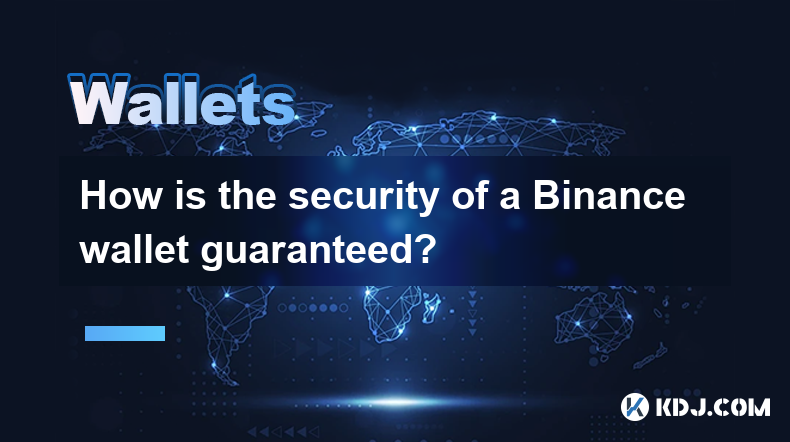
Key Points:
- Binance's wallet security relies on a multi-layered approach encompassing hardware security modules (HSMs), multi-signature authorization, and robust encryption.
- User security is primarily the responsibility of the individual, emphasizing the importance of strong passwords, two-factor authentication (2FA), and avoiding phishing scams.
- Binance's insurance fund aims to mitigate losses from potential security breaches, though it doesn't guarantee complete protection against all risks.
- Regular security audits and updates are crucial for maintaining the platform's security posture. Transparency regarding these measures builds user trust.
- Understanding the different wallet types offered by Binance (exchange wallet, Trust Wallet) and their respective security implications is essential for users.
How is the Security of a Binance Wallet Guaranteed?
Binance, one of the world's largest cryptocurrency exchanges, employs a multifaceted security strategy to protect user funds. However, it's crucial to understand that complete security is virtually impossible in the realm of digital assets. Binance's approach focuses on minimizing risks through various layers of protection.
One primary method is the use of hardware security modules (HSMs). These physical devices store cryptographic keys offline, significantly reducing the vulnerability to hacking attempts targeting online systems. The keys are crucial for accessing and transferring cryptocurrency, and their offline storage represents a significant barrier to unauthorized access.
Beyond HSMs, Binance utilizes multi-signature authorization. This means that multiple individuals must approve transactions before they are executed, preventing any single point of failure. This layered authorization significantly increases the difficulty for malicious actors to compromise the system and steal funds. It adds an extra layer of verification before any significant actions are taken.
Robust encryption techniques are also employed throughout Binance's systems. Data is encrypted both in transit and at rest, protecting it from unauthorized access even if a breach were to occur. This encryption safeguards sensitive user information and prevents its unauthorized disclosure.
While Binance employs strong security measures, the responsibility for securing individual accounts ultimately rests with the users. Strong, unique passwords are essential, and enabling two-factor authentication (2FA) adds an extra layer of protection against unauthorized logins. 2FA typically requires a code from a separate device, making it much harder for hackers to gain access even if they obtain your password.
Furthermore, users must be vigilant against phishing scams. Binance will never request login credentials or private keys via email or other unsolicited communication. Always verify the legitimacy of any communication claiming to be from Binance through official channels before taking any action. Be cautious of suspicious links or requests for personal information.
Binance also maintains an insurance fund designed to compensate users for losses resulting from security breaches. However, it's important to remember that this fund doesn't guarantee full compensation in all scenarios. The scope of coverage and the process for claims can vary depending on the nature of the security incident. It acts as an additional safety net but should not be solely relied upon.
To maintain a high level of security, Binance conducts regular security audits and updates its systems to address vulnerabilities and incorporate the latest security protocols. Transparency in reporting these audits and updates is crucial for maintaining user trust and confidence in the platform's security measures. Open communication helps users understand the ongoing efforts to protect their assets.
It's crucial to understand the differences between the various wallet options offered by Binance. The exchange wallet, used for holding funds directly on the Binance exchange, offers a level of convenience but is inherently more vulnerable to platform-wide security breaches, albeit protected by the measures mentioned above. Binance also supports Trust Wallet, a separate mobile wallet that offers greater control over private keys but requires more user responsibility in terms of security management. Choosing the right wallet depends on your individual risk tolerance and technical expertise.
Frequently Asked Questions:
Q: Is my cryptocurrency completely safe in a Binance wallet?
A: No, while Binance employs robust security measures, no system is entirely immune to breaches. User vigilance and adherence to best security practices are crucial.
Q: What should I do if I suspect unauthorized access to my Binance account?
A: Immediately change your password, enable 2FA if you haven't already, and contact Binance support. Report the incident to relevant authorities if necessary.
Q: What is the role of Binance's insurance fund?
A: It's designed to compensate users for losses in the event of certain security breaches, but it doesn't guarantee complete protection against all risks.
Q: What are the key differences between Binance's exchange wallet and Trust Wallet?
A: The exchange wallet offers convenience but is more susceptible to platform-wide breaches. Trust Wallet provides greater user control over private keys but demands higher user responsibility for security.
Q: How often does Binance conduct security audits?
A: The frequency of audits is not publicly disclosed in detail, but Binance emphasizes continuous security improvements and regular updates. Transparency around this is evolving.
Q: What is the best way to protect my Binance wallet from phishing attacks?
A: Always verify the authenticity of any communication claiming to be from Binance through official channels. Never click on suspicious links or provide your login details or private keys unsolicited.
Disclaimer:info@kdj.com
The information provided is not trading advice. kdj.com does not assume any responsibility for any investments made based on the information provided in this article. Cryptocurrencies are highly volatile and it is highly recommended that you invest with caution after thorough research!
If you believe that the content used on this website infringes your copyright, please contact us immediately (info@kdj.com) and we will delete it promptly.
- AB (formerly Newton Project) rebrands to target real-world asset (RWA) tokenization
- 2025-04-01 16:10:12
- Cryptocurrency Entrepreneur Chun Wang and a Team of 3 Astronauts Set Off on a Historic SpaceX Flight
- 2025-04-01 16:10:12
- Pi Network Continues to Struggle, Nearing a New All-Time Low
- 2025-04-01 16:05:12
- The memecoin hype is dying. Trading on pump dot fun is down by 94%.
- 2025-04-01 16:05:12
- Pi Network’s Price Plummets as Bearish Momentum Grows
- 2025-04-01 16:00:11
- Aptos (APT) and Sonic (S) Have Seen Notable TVL Growth, While Solana (SOL), Ethereum (ETH), and Arbitrum (ARB) Have Experienced Decreases
- 2025-04-01 16:00:11
Related knowledge
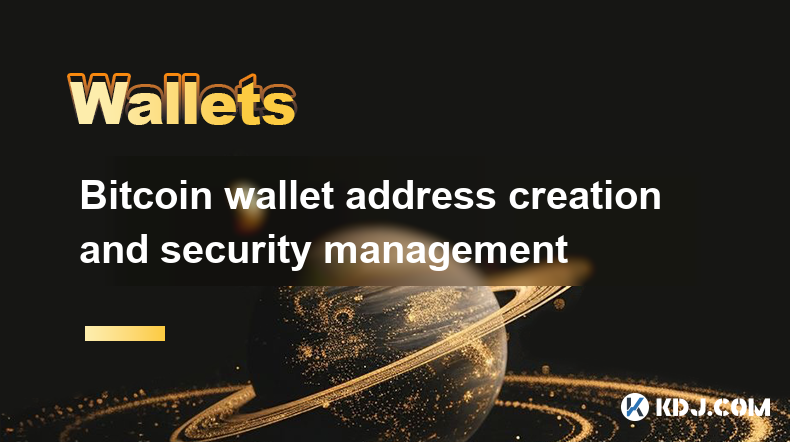
Bitcoin wallet address creation and security management
Mar 31,2025 at 10:56pm
Understanding Bitcoin Wallet AddressesA Bitcoin wallet doesn't store Bitcoin directly. Instead, it stores private keys which are long strings of characters. These keys grant access to your Bitcoin. Your public key, derived from the private key, is used to generate your Bitcoin wallet address, a unique identifier similar to a bank account number. This a...

How to easily generate a Bitcoin payment address
Mar 29,2025 at 10:49am
Generating a Bitcoin payment address might seem daunting, but it's actually quite straightforward. This process is crucial for receiving Bitcoin, as each transaction requires a unique address. Understanding how this works is fundamental to using Bitcoin effectively. This guide will walk you through the simple steps, regardless of your technical experti...
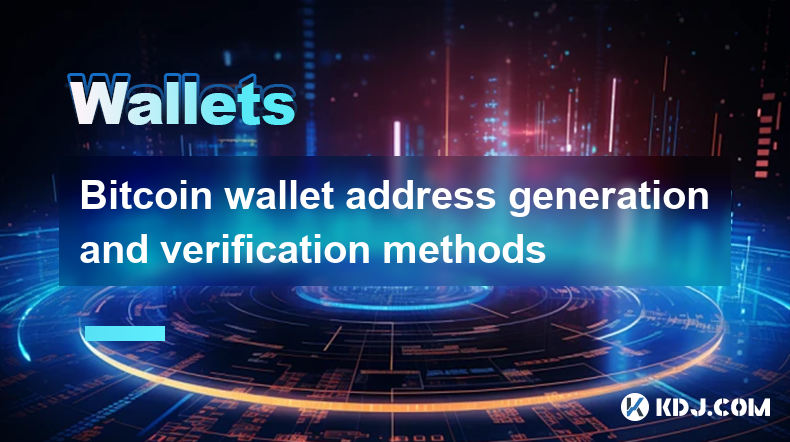
Bitcoin wallet address generation and verification methods
Apr 01,2025 at 11:01am
Understanding Bitcoin Wallet AddressesA Bitcoin wallet address is a unique identifier, similar to a bank account number, used to receive and send Bitcoin. It's a string of alphanumeric characters, crucial for participating in the Bitcoin network. Understanding how these addresses are generated and verified is paramount for secure Bitcoin transactions. ...
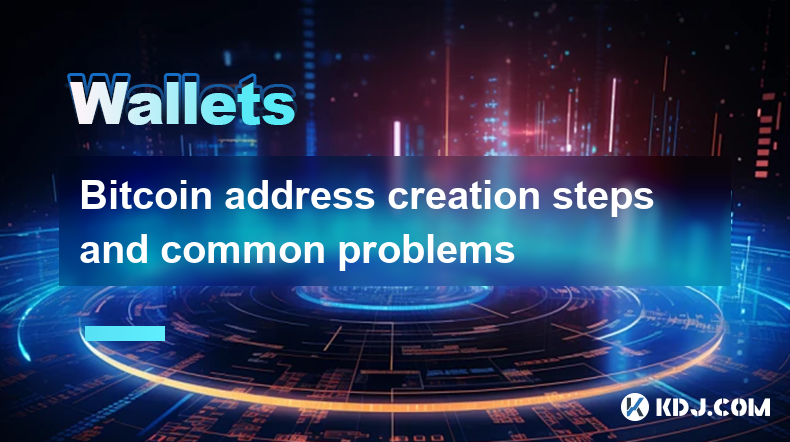
Bitcoin address creation steps and common problems
Mar 30,2025 at 06:07am
Understanding Bitcoin AddressesA Bitcoin address is a unique identifier, similar to a bank account number, used to receive Bitcoin. It's a string of alphanumeric characters generated from a public key, derived from your private key. Understanding the distinction between public and private keys is crucial for Bitcoin security. Your private key should be...
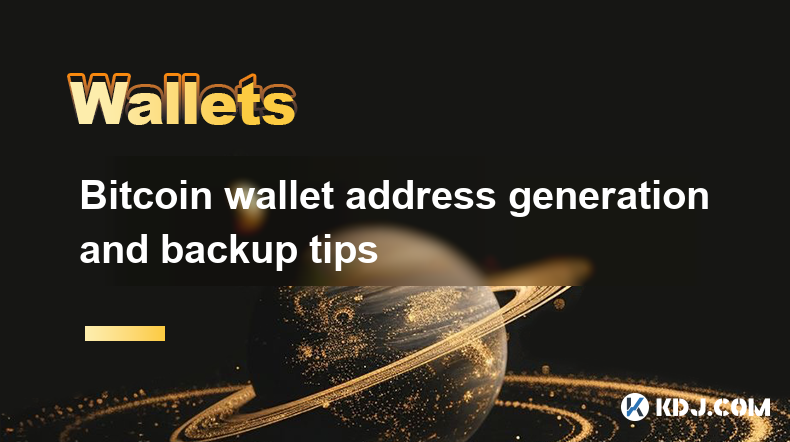
Bitcoin wallet address generation and backup tips
Apr 01,2025 at 05:00pm
Understanding Bitcoin Wallet AddressesA Bitcoin wallet address is essentially your unique identifier on the Bitcoin blockchain. It's a string of alphanumeric characters used to receive Bitcoin. Unlike bank accounts, you can have multiple addresses associated with a single wallet. These addresses are generated by your wallet software using cryptographic...
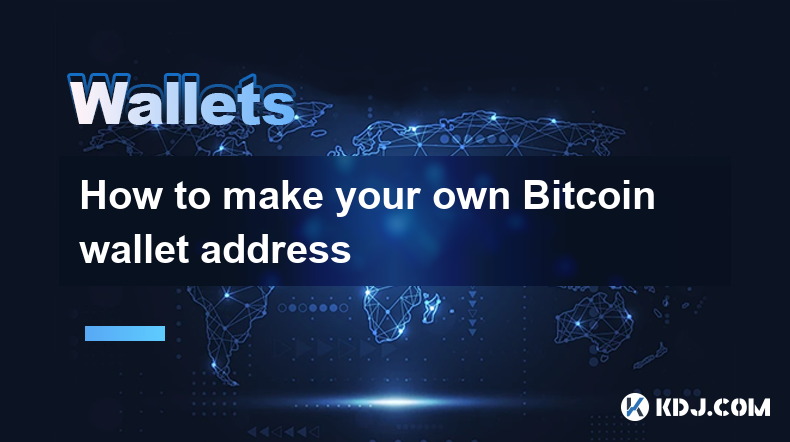
How to make your own Bitcoin wallet address
Mar 29,2025 at 08:42pm
Creating your own Bitcoin wallet address is crucial for securing and managing your Bitcoin holdings. It allows you to independently receive and send Bitcoin without relying on third-party services. This process involves understanding the different types of wallets and choosing the one that best suits your needs and technical expertise. Incorrectly gene...

Bitcoin wallet address creation and security management
Mar 31,2025 at 10:56pm
Understanding Bitcoin Wallet AddressesA Bitcoin wallet doesn't store Bitcoin directly. Instead, it stores private keys which are long strings of characters. These keys grant access to your Bitcoin. Your public key, derived from the private key, is used to generate your Bitcoin wallet address, a unique identifier similar to a bank account number. This a...

How to easily generate a Bitcoin payment address
Mar 29,2025 at 10:49am
Generating a Bitcoin payment address might seem daunting, but it's actually quite straightforward. This process is crucial for receiving Bitcoin, as each transaction requires a unique address. Understanding how this works is fundamental to using Bitcoin effectively. This guide will walk you through the simple steps, regardless of your technical experti...

Bitcoin wallet address generation and verification methods
Apr 01,2025 at 11:01am
Understanding Bitcoin Wallet AddressesA Bitcoin wallet address is a unique identifier, similar to a bank account number, used to receive and send Bitcoin. It's a string of alphanumeric characters, crucial for participating in the Bitcoin network. Understanding how these addresses are generated and verified is paramount for secure Bitcoin transactions. ...

Bitcoin address creation steps and common problems
Mar 30,2025 at 06:07am
Understanding Bitcoin AddressesA Bitcoin address is a unique identifier, similar to a bank account number, used to receive Bitcoin. It's a string of alphanumeric characters generated from a public key, derived from your private key. Understanding the distinction between public and private keys is crucial for Bitcoin security. Your private key should be...

Bitcoin wallet address generation and backup tips
Apr 01,2025 at 05:00pm
Understanding Bitcoin Wallet AddressesA Bitcoin wallet address is essentially your unique identifier on the Bitcoin blockchain. It's a string of alphanumeric characters used to receive Bitcoin. Unlike bank accounts, you can have multiple addresses associated with a single wallet. These addresses are generated by your wallet software using cryptographic...

How to make your own Bitcoin wallet address
Mar 29,2025 at 08:42pm
Creating your own Bitcoin wallet address is crucial for securing and managing your Bitcoin holdings. It allows you to independently receive and send Bitcoin without relying on third-party services. This process involves understanding the different types of wallets and choosing the one that best suits your needs and technical expertise. Incorrectly gene...
See all articles























































































